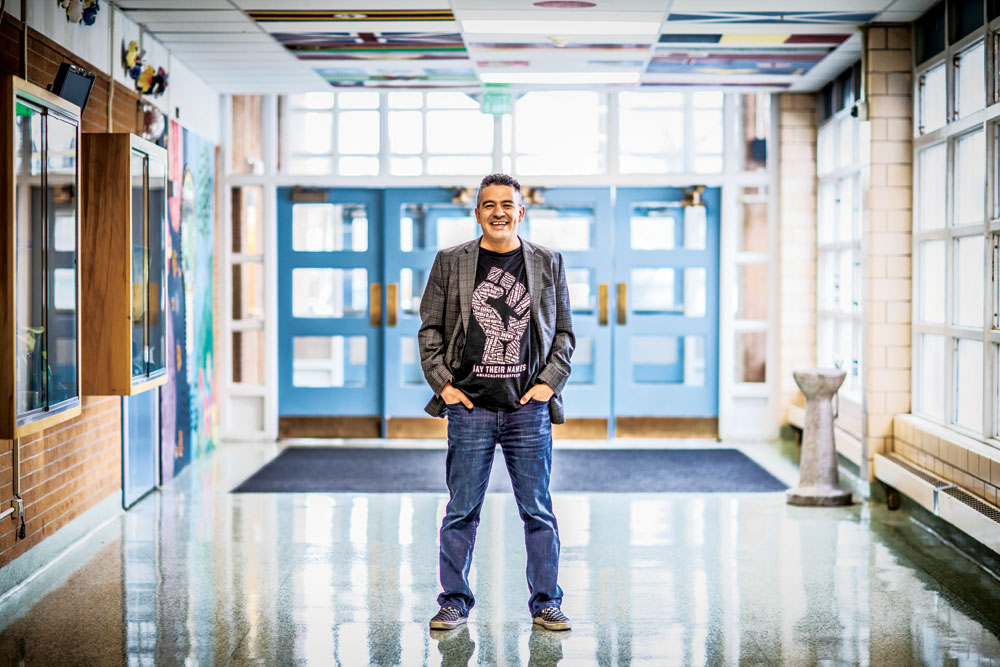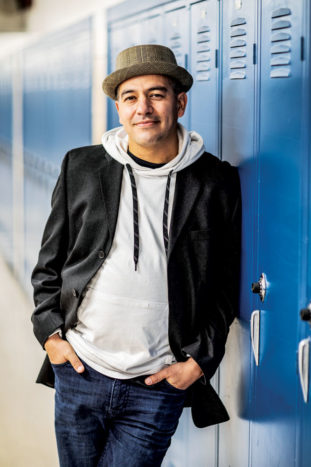
2021 Colorado Teacher of the Year Gerardo Muñoz is pictured at the Denver Center for International Studies at Baker. Photos by 211 Photography
“I’m a nerd—I love to learn and share what I learn. The kids say my enthusiasm is contagious; they get excited when the teacher is excited,” says Gerardo Muñoz, a middle and high school teacher who has been named Colorado’s 2021 Teacher of the Year.
The Denver native and resident of Central Park since 2017 teaches social studies at the Denver Center for International Studies at Baker, where he has worked for 14 years. “Many of my students are the third, fourth or fifth member of their family to be in my class,” Muñoz said. “We’re a tight community. Families have trusted our school for years.”
Muñoz attributes his success to caring about his students and focusing on their strengths. “I’m always empathetic, and I create a nurturing environment. I believe every young person is exactly who they are supposed to be, but they don’t have the skills yet. I help them to become complete.”

Gerardo Muñoz, who teaches social studies the Denver Center for International Studies at Baker, says “I believe every young person is exactly who they are supposed to be, but they don’t have the skills yet. I help them to become complete.”
Muñoz earned his bachelor’s degree in history and Latin American studies from the University of Colorado and a master’s degree in curriculum and instruction from the University of Denver.
As Teacher of the Year, Muñoz will receive many professional development opportunities, including membership in the Colorado Education Commissioner’s Teacher Cabinet. He will represent the entire profession in Colorado and be the public face of Colorado’s teachers. “I’ll have a platform to amplify the stories of the 40,000 teachers in Colorado.”
Muñoz teaches ethnic studies, world history and community organizing. His style is helping students find their presence in various subjects. “Ethnic studies allows students to reflect on their own identities. Where do my ancestors fit? What is the historical relationship between groups? Students respond to things that feel relevant to their lived experiences.”
Students are challenged to become community organizers. “Contrary to what some people think, teenagers want to make a difference,” Muñoz said. “We discuss how to formulate policy around issues. Community organizing is just connecting with people and finding out what they need. Everything becomes a debating point. The discourse is important because lots of people don’t know how to do that. It’s part of becoming a strong, interdependent society.”
He said teaching remotely under Covid restrictions is the hardest thing he’s done as a teacher. “I have relationships with the kids. It’s hard without the informal opportunities to connect, like them dropping into my office or seeing them in the cafeteria. I’m attentive to how this time is affecting them. It helps my understanding to have a 15-year-old daughter who is experiencing it.”
Denver Center for International Studies at Baker was ranked No. 7 among Denver’s 58 high schools by U.S. News & World Report in 2018. Minority enrollment at DCIS is 76%, and 61% of students are economically disadvantaged. Muñoz said the school earned its high ranking because of the rigorous coursework it offers, including advanced placement classes starting in 9th grade. “Lots of students of color are enrolled in the AP classes, and a very high number go to college.”
DCIS does not require admission testing. Muñoz attributes the school’s success to its idealistic programs and opportunities to travel. “Our students went to Spain last year. Kids come here if they want to see the world.”




0 Comments